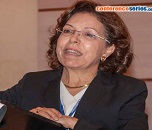
Nadia H. Rizkalla
Suez Canal University, Egypt
Title: Screening program for congenital hypothyroidism in Egypt (2007-2010): Coverage and main outcomes
Biography
Biography: Nadia H. Rizkalla
Abstract
The Egyptian Ministry of Health and Population (MOHP) endorsed the screening program for congenital hypothyroidism (CH) using TSH assay method. This study aims to study and evaluate the impact of CH on growth and development of treated cases, compliance of the healthcare providers' (physician and nurse) to the current program, compliance of the target families' to the current protocol of management program, and the coverage rate for 3 years (2007-2010). The study was carried out through descriptive, cross-sectional and follow-up approaches in pediatric clinic of Insurance Students' Hospital in Ismailia Governorate. The setting is responsible for management of positive CH cases detected by screening test within the national program. The tools used for data collection included a structured interview questionnaire for mothers of CH infants in addition to physical examination of infants including anthropometric measurements. An open interview questionnaire was used for healthcare providers, and an abstraction checklist form to assess the coverage rate of the program from records of live births and positive cases. The coverage rates of the program were 92.4%, 91.7%, and 90.9% for the years 2007, 2008, and 2009 respectively. Screening was done for 86.7% of studied subjects at age range 7-14 days, and 53.3% of cases were confirmed at this age. 60% of cases started therapy at age 14-21 days; 20% and 26.7% of cases showed improvement for wt/age and ht/age respectively, and 40% and 26.7% in personal-social and problem solving areas respectively. Only one third of mothers were informed about the test during pregnancy, and their compliance rates to therapy, scheduled visits, and investigations were 53.3%, 26.7%, and 86.7% respectively. Although studied physicians were aware of the national program, they had deficient knowledge about CH diagnosis and therapy, whereas nurses were not aware of the importance of health education to mothers. In conclusion, the program coverage is high and the outcomes of therapy are promising. Healthcare providers’ awareness and knowledge need to be improved.

